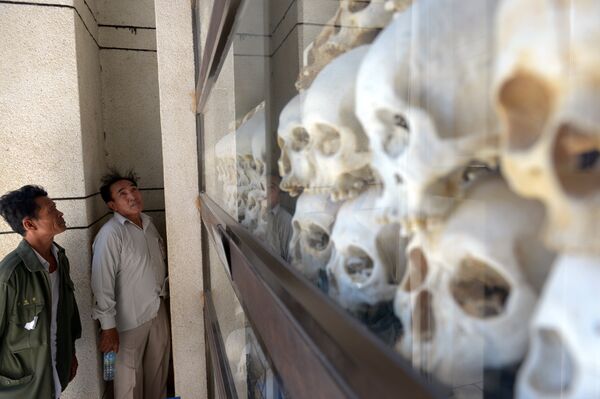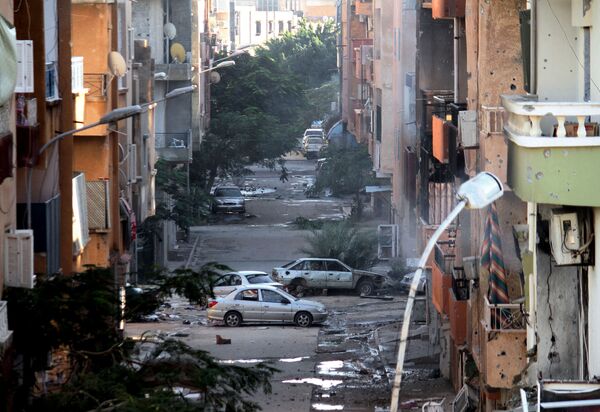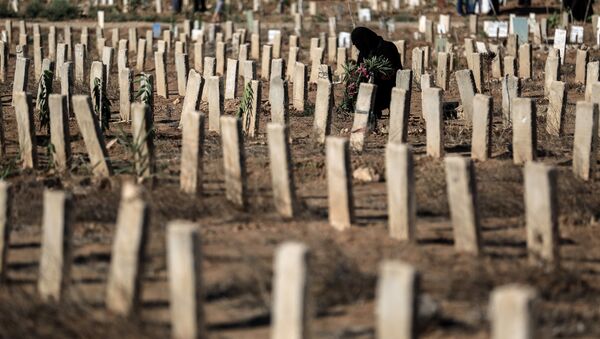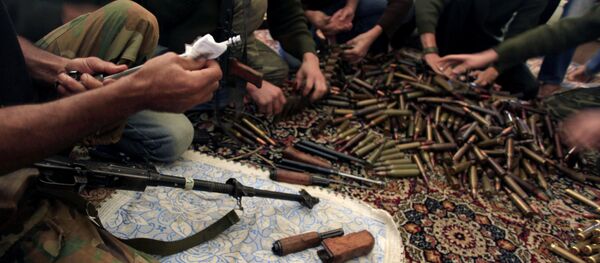This particular rebel group is fortunate in that it enjoys the backing and sanction of Washington, part of the State Department's "moderate" faction of rebel groups as opposed to the extremist faction exemplified by the likes of Nusra and Daesh.
The Nour al-Din al-Zinki Movement has confirmed the video's authenticity and that the men responsible belong to the group. The beheading of Mahmoud Issa, they claim, was an "individual mistake."
This crime committed by US-backed Nour al-Din al-Zinki rebels is a reminder to the US administration of where our tax money is being spent.
— Chaker Khazaal (@ChakerKhazaal) July 21, 2016
US Secretary of State John Kerry, meanwhile, said in response to the murder:
"Obviously we're very concerned. If proven, it would give us pause about any assistance or, frankly, any further involvement with this group."
In light of the horrific slaughter, there is simply no longer any justification for supporting the polyglot Syrian opposition, regardless of whether they come packaged as extremists or moderates.
The Syrian people do not have the luxury of making any such distinction: a head-chopping fanatic is a head-chopping fanatic, and by now it is inarguable that in Syria there is no nice, cultured, pro-democracy opposition waiting to replace the Assad government in Damascus should it fall. There is instead the guarantee that Syria would enter an abyss of slaughter and butchery such as the world has not seen in many a year. Syria's past and present as a non-sectarian, secular state would be no more and its future as a mass grave would begin.
The longer US supports so-called "moderate opposition" the longer will be the list of innocent victims #PrayForSyria pic.twitter.com/3pQKgmxkbL
— Jeblary Bushton (@Jeblary2016) July 20, 2016
This stark choice facing the Syrian people is what drives the Syrian Arab Army to continue resisting the invasion of their land by thousands of crazed Salafi-jihadists, despite the battering it has taken over five long years of unremitting carnage. They are fighting an enemy driven by the most barbaric and brutal ideology to emerge since the Khmer Rouge turned Cambodia into a vast killing field in the 1970s.
One of 1.5 million citizens executed by the Khmer Rouge regime in Cambodia for the great crime of "being educated". pic.twitter.com/G7Qb1Ku3Qf
— Bizarrepedia (@bizarrepedia) July 24, 2016
And just like the Khmer Rouge, who slaughtered 2 million people before their four-year reign of terror in Cambodia was ended in 1979 by the intervention of the People's Army of Vietnam, the various Salafi-jihadist groups that have been laying waste to large tracts of Syria in recent years are intent on returning the country to their own version of "Year Zero."

The similarity does not end there. For in Cambodia in the 1970s and across Syria and Iraq just over three decades later, the seeds of chaos and resulting societal collapse from which both the Khmer Rouge and its modern Middle East incarnation sprouted were seeds planted by Washington.
Cambodia was carpet-bombed between 1969 and 1973 with the strategic objective of denying the North Vietnamese Army the ability to use it to transport troops, weapons, and supplies into South Vietnam. The bombing campaign was concentred on the countryside, where 90 percent of the country's population lived in villages and hamlets. John Pilger — whose 1979 documentary "Year Zero" on the brutality of the Khmer Rouge in Cambodia remains a glowing testament to investigative journalism — writes that:
"During one six-month period in 1973, B-52s [US bombers] dropped more bombs in 3,695 raids on the populated heartland of Cambodia than were dropped on Japan during all of the Second World War: the equivalent, in tons of bombs, of five Hiroshimas."
Pilger records that the carpet-bombing of Cambodia "provided a small group of fanatical Maoists, the Khmer Rouge, with a catalyst for a revolution which had no popular base among the Khmer people."
The Arab Spring of 2011, which began as a revolutionary wave of mass protest, toppling the US-backed dictatorships of Ben Ali in Tunisia and Mubarak in Egypt, was transformed into an Arab winter when it arrived in Libya. Lacking mass and popular support, from this point it could only succeed with western intervention, turning it into a counter revolutionary movement whose vanguard now included Salafists intent on turning the clock back in Libya and the wider region to the seventh century.
Five years later Libya is destroyed, a pale imitation of a functioning state, while Syria remains engulfed in a struggle for its survival. And in this struggle the only moderates are the soldiers of the Syrian Arab Army and its allies.

The brutal beheading of 12-year-old Mahmoud Issa by US-backed rebels will forever stand as an indictment of Washington's role in a conflict in which the choice facing the world is between barbarism and civilization.
In other words, there is no choice at all.





